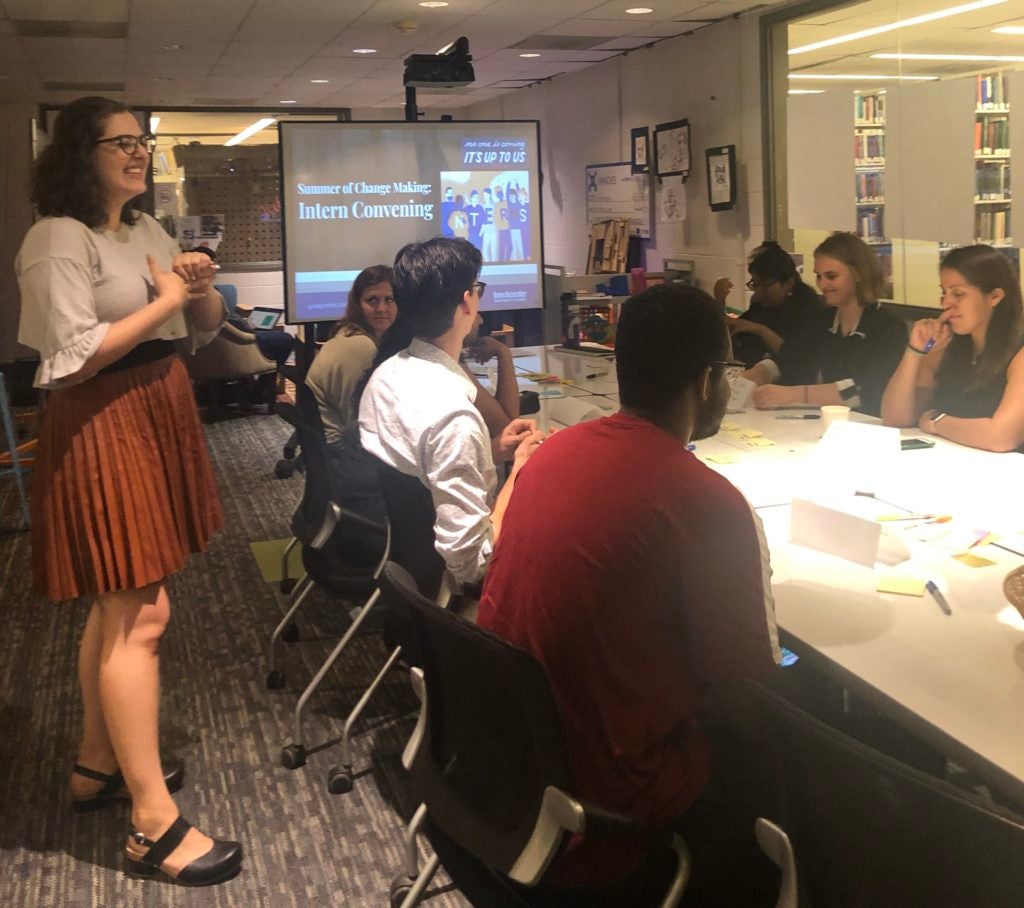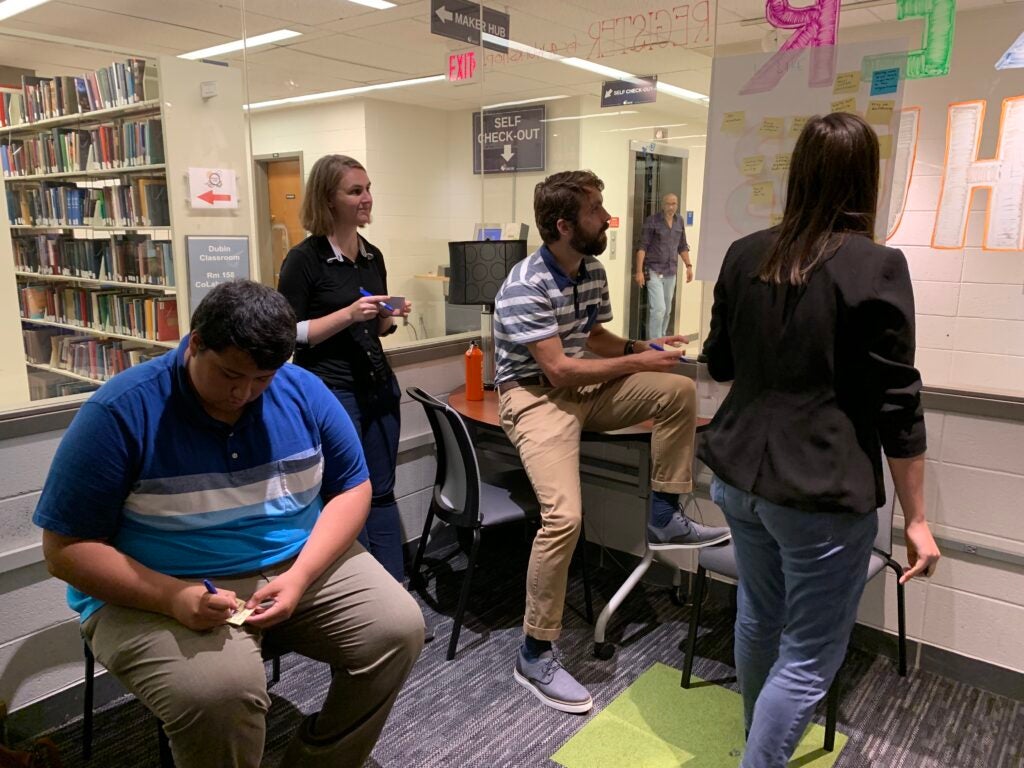The Power of Community: Social Change Intern Convening
August 29, 2019 | By Jillian Gilburne
It takes grit to advocate for change in the public sector. The process of making a meaningful social impact can be lonely and slow; the levers of political power too rusty, and the egos manning them too large.
For students and young professionals just starting out, the prospect of such a hostile work environment can be overwhelming. Without the proper support system, confidence, and resources, many simply give up on challenging the status quo. And who could blame them? Pushing boundaries, breaking molds, and working interdisciplinarily are not nearly as simple and glamorous as we’re often raised believing.
In fact, it was my pursuit of a community and support system that brought me to the Beeck Center Student Analyst program this summer. I wanted to join a team of innovative optimists working to scale social impact and support efforts to bring young technologists and designers into public service, and I found it. But I quickly realized that there were hundreds of other students across the D.C. area interested in developing innovative solutions to complex problems that I hadn’t met yet. In the spirit of collaboration, I started making plans for a Summer of Social Change Intern Convening.
Community building, especially within the public interest technology space, is one of the core premises of the Digital Service Collaborative, the project I’ve spent the summer working on. We know that when thought leaders and practitioners come together to problem solve and collaborate, morale strengthens and we generate better ideas. But what about those of us who are just getting started in our professional careers or just beginning to understand how we fit into the public sector innovation ecosystem? While reading about the work being done by practitioners in the civic tech space is useful, it’s also important to develop a newcomer network — a group of co-collaborators and sounding boards who understand what it’s like to just be starting out.
This is especially important for students entering the civic technology and social impact fields. Because we are usually working at the intersections of multiple disciplines, we don’t quite fit in anywhere. We are technologists, designers, discourse fixers, legal and policy wonks, activists, and economists bonded by a desire to make government and its related institutions work better for the people they are intended to serve. So, it’s important for us to find others who understand or sympathize with the mission.
On a Tuesday afternoon in the Idea Lab of the Georgetown University Library, the Beeck team gathered 18 interns and young professionals from 10 different organizations and 11 universities to identify and address some of the most frustrating roadblocks to being a young person in a social innovation space. These organizations spanned sectors and included leaders in government transparency, human-centered design, election reform, funding social impact projects, and recruiting tech talent into the public sector.

Beeck Center Student Analyst Jillian Gilburne facilitates our Summer of Social Change Intern Convening on August 6, 2019. Photo by Céline Chieu.
We started by sharing methods and techniques that we’ve used to support our change making efforts in the past — mentoring, storytelling, challenging ourselves, and looking out for people whose voices are often ignored. We realized early on that regardless of where we came from or which organization we worked for, we had all developed similar toolkits for assessing complicated problems.
The similarities didn’t stop there. As we started talking about the successes and hardships of our summer work, we encountered more of the same. Topics included changing perceptions around public sector work, navigating hierarchies and bureaucracies, helping non-technical bosses understand technical constraints, and figuring out what a career in social impact might actually look like.

Convening participants capture the highs and lows of their summer work on sticky notes. Photo by Céline Chieu.
Together we shared our concerns about finding mentors, pitching new ideas to skeptical co-workers, and feeling understood. We also offered up anecdotes about and suggestions for how we had dealt with similar problems in the past. For example, many of us had struggled with selling new ideas to upper level management. If we pitch an idea that is too half-baked it will be disregarded as infeasible, but if we wait too long, our internship will be over before it ever comes close to being actualized. In the end, we left with some good advice and a better understanding of how our interests might fit into the larger public reform ecosystem.
I normally hate networking events but I really enjoyed talking with the other people I met today! It was really reassuring to hear that other people have a lot of the same problems I do. — Convening Attendee
Obviously, we were never going to fix everything in an afternoon, but when working towards something as nebulous as social impact, simply coming together as young people to talk about our experiences and support each other can go a long way. So, thank you to the Beeck Center for creating a space for the social impact interns of D.C. to come together to develop new relationships and to debrief after a summer of changemaking. As the summer comes to an end, I can’t wait to see how the Beeck Center will continue to help interns and early career professionals from across the city and the country come together to strategize by hosting more of these convenings throughout the school year.
And as I return to Northwestern University for my senior year, after a summer of researching how we can better support newcomers to the public interest technology space, I have plans to host a series of interdisciplinary salons where students and faculty come together to discuss how their field might approach a particular problem to ensure that technologists, designers, and policy leaders alike know that social impact is an option for their work.
—
Jillian Gilburne was a Summer 2019 Student Analyst supporting the Data + Digital team, and this fall will return to Northwestern University, where she will be a senior majoring in Communication Studies, Political Science, and Human-Centered Design. Follow her on Twitter @JillianGilburne.